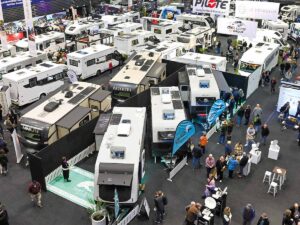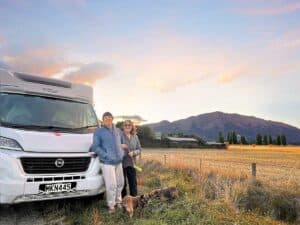For more and more Kiwis, a motorhome or caravan is the perfect complement to an active, outdoor lifestyle, accompanying the multitude of stunning, yet easily accessible destinations.
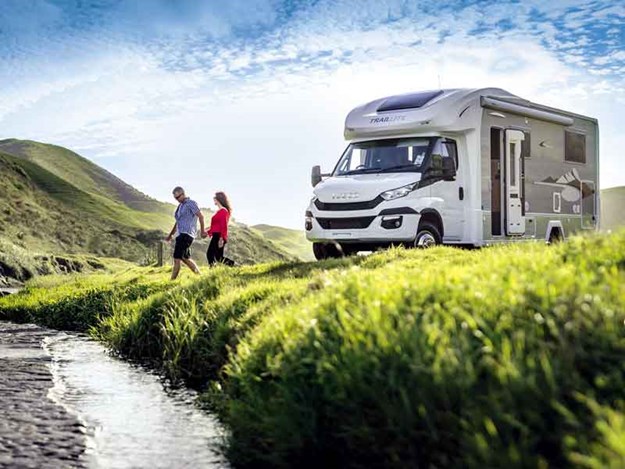
New Zealand’s expanding network of off-road cycling trails and great walks tend to be off the beaten track. So a certified self-contained vehicle that enables you to freedom camp and provides you with all the comforts of home is the ideal base for your adventures.
But not all RVs are created equal, as you’ll no doubt be aware once you start looking at RVs and thinking about which one is right for you. Thanks to TrailLite for providing the tips below, a snippet from their Essential Need to Knows booklet available for download on their website.
Making the right purchase decision
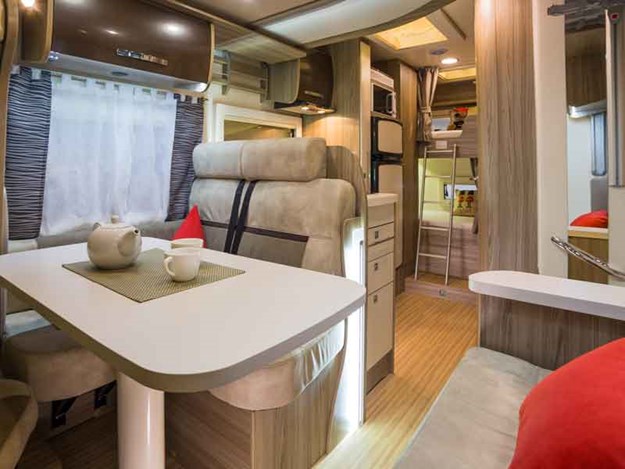
In order to make an informed decision, it’s wise to think carefully about how you intend to use the motorhome or caravan. Asking the right questions will help you get the right vehicle for you, these may include:
- How will you be using the vehicle, occasional weekends only or for longer?
- Are you excited about the adventure of freedom camping or are campground stays more your thing?
- How many of you will usually be travelling in the motorhome or caravan?
- What makes and models offer the lowest total cost of ownership?
- What aftersales service is available?
- Who are the long-term motorhome and caravan dealerships with rock-solid reputations and are they able to provide an appropriate level of back up and service?
- How much are the on-road costs? Have you also considered insurance, depreciation, fuel, and maintenance costs?
- What’s the likely resale on the brand of vehicle you’re considering?
As most experienced motorhome and caravan manufacturers know, it’s most likely the following issues that will make the biggest difference to your enjoyment of life on the road.
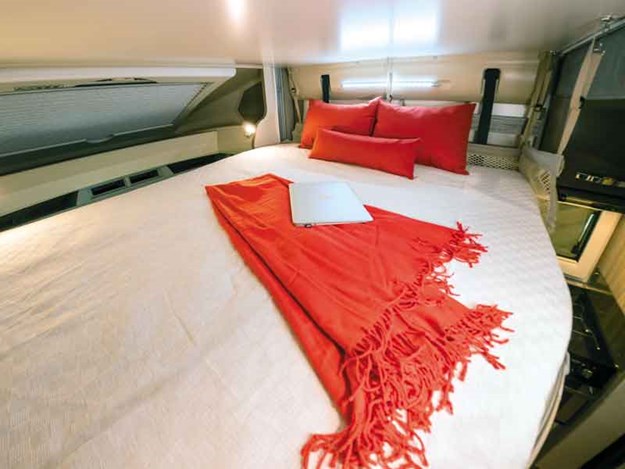
- How do you plan to use your motorhome or caravan? If you dream of spending weeks at a time ‘off the grid’ or maybe intend to live in the motorhome for extended periods, then what fits you best will be quite different than if your intent was to enjoy the occasional weekend away, hooked up to the facilities at a motor camp.
- What’s the vehicle’s capacity for extended periods of freedom camping? To ensure you can stay away from civilisation for longer, you need large fresh water and wastewater storage; superior battery capacity and solar power; plus significant gas storage, refrigeration capacity and general storage. These are all things that are not immediately visible when you inspect a potential purchase, but they are all vital to your level of enjoyment of your vehicle so need careful consideration.
- Does the bed provide a great night’s sleep? Amazingly, this is probably the #1 reason why many first-time motorhome purchasers become dissatisfied with their ‘bargain’ purchase. Many first-time purchasers base their opinion on two or three nights away in a basic motorhome and think making up the bed each night will be fine. Forget foam mattresses—a quality inner-sprung should be a given; and today’s trend is for ‘island’ beds—a bed that you can walk around, rather than one that’s stuck up against a wall.
- How about kitchen design, the heart of your motorhome or caravan? When you’re enjoying the freedom of the road for months at a time, you need a functional work area and the fittings and appliances that go with it—stove, microwave, roomy fridge/freezer. Not to forget generous storage capacity for food and utensils!
Defining value beyond ‘bargain’
Purchasing a motorhome is a significant investment in anyone’s language. So it’s easy to think you’re saving money buying a cheaper motorhome or caravan only to find you’ve made an expensive mistake that’s far from ideally suited to your needs.
Looking beyond the initial purchase price to the total cost of ownership means understanding all the factors that will impact your ease of use (and costs) in the years ahead. These can include:
- the warranty
- the impact of depreciation (which can vary as much as between 20% and seven percent in the first year alone)
- ability to meet your long-term needs
- the availability of parts and support
The down-low on warranties
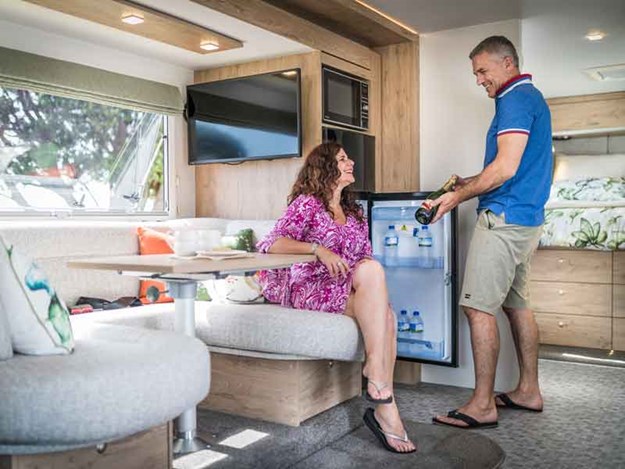
Some motorhomes have a warranty that starts once the motorhome leaves the factory, not once the buyer purchases the motorhome. A motorhome from a reputable manufacturer will carry a rock-solid, factory-backed warranty on the base vehicle, however, that’s often not the case with some imported motorhomes, which are supported only by mechanical insurance. Always ask the following questions:
- How long is the warranty—these can range from one to five years—and what does it cover?
- Research the dealership—will they be there when you need them?
- Does the dealership have an aftersales programme?
In some cases, motorhomes come into New Zealand on base vehicles that you can’t buy in this country or elsewhere in Australasia.
This means parts, and the trained service they require aren’t available locally, leading to delays and increased costs. Some key questions to ask when considering the purchase of a motorhome include:
- Does the base vehicle carry a full vehicle manufacturer’s global warranty?
- Is the base vehicle model readily available in New Zealand?
- Are genuine manufacturer’s spare parts readily available in this country?
- Does the person selling you the vehicle have established professional premises?
A final tip is to make sure you are ‘comparing apples with apples’ as leading manufacturers’ standard specifications often include items that others list as options.
What does certified self-contained (csc) mean, and why is it important?
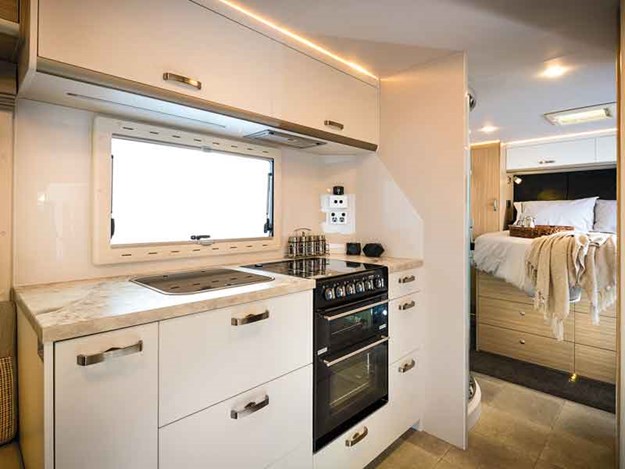
A Certified Self-Contained vehicle is designed to completely meet the ablutionary and sanitary needs of the occupants (including water for drinking and cooking) for a minimum of three days without requiring any external services or discharging any waste.
Wastewater is collected in holding tanks then disposed of via a dump station. Dump stations, which are located nationwide, are connected to reticulated sewerage or septic tank systems, therefore, the treatments used in the wastewater must be approved toilet chemicals or treatments that do not affect the operation of these systems.
While a self-containment certificate proves compliance with the standard, the bare minimum of CSC requirements won’t meet the needs of enthusiastic Kiwis who want to enjoy all that the New Zealand great outdoors has to offer.
The market leaders’ motorhomes offer significantly bigger fresh water tanks and waste storage. This means you’ll be able to stay at your favourite spots for longer, rather than having to run back into town every few days to fill up your water and dump your waste.
Many motorhomes and caravans built for overseas conditions, where freedom camping isn’t such a common activity, are designed to cater for owners who generally drive from campground to campground, so they don’t need the capacity that’s so essential in our environment.
What are your base vehicle options?
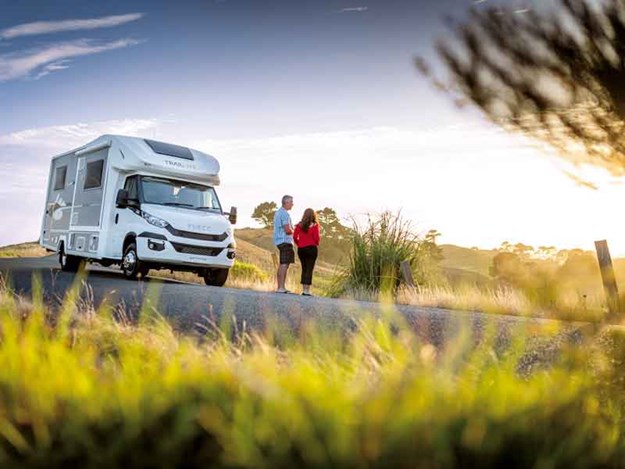
Two main categories of base vehicles are available, European and Japanese, with both offering outstanding quality. So in many cases choice comes down to personal preference.
Whichever you choose, the latest Euro five emission controls are now standard for all new base vehicles from reputable New Zealand manufacturers. Safety features include dual airbags and ABS brakes as standard and even advanced features such as ESP standard on many base vehicles.
- European style: Mercedes-Benz Sprinter, Fiat Ducato, Ford Transit, Iveco Daily, Volkswagen Crafter. Comfortable, refined, and car-like, European-style base vehicles feature a walk-though cab, swivel seats, a comfortable driving position and have more safety features. They’re economical and can mostly be driven on car licences, and typically used for smaller motorhomes. The Iveco powered motorhomes are the exception to the rule due to their load carrying capacity being higher. This allows for the added weight of the top-of-the-line features.
- Japanese style: Mitsubishi Fuso Canter, Isuzu N-series. Large, powerful, and ideal for towing, these vehicles offer reliability and cost efficiency, ideally suited for larger motorhomes, with excellent options for storage, batteries, etc.
- Front-wheel drive or rear-wheel drive? The answer to this really comes down to your lifestyle and where you plan on going with a motorhome. In a motorhome, most of the weight is over the back of the vehicle. If you get in a slippery situation, you want the weight over the driven wheels. A front-wheel drive vehicle with insufficient weight on the wheels can face challenges when driving on slippery surfaces such as gravel and grass, however, lots of people choose front-wheel drives because they don’t plan on being at these types of destinations. With most rear-wheel drive vehicles, you’ll have the added benefit of dual wheels at the back, giving you better traction. You don’t want to get stuck!
- What transmission will you choose? The three main transmissions are manual, automatic, and AMT (Automated Manual Transmission) or known with the Fiats as Comfort-Matic. An AMT/Comfort-Matic basically means you can choose between automatic, semi-automatic, or manual driving and the right gear will be engaged in response to the different driving conditions. While the trend in motorhome ownership is towards an Auto or AMT/Comfort-Matic, it comes down to personal preference and it isn’t unusual for people to want only a manual transmission.
- Planning to tow a car or heavy trailer? Most new motorhomes have a maximum unbraked tow capacity of only 750kg. So if the car or heavy trailer you’re towing doesn’t have its own ‘in-tow’ braking system, you could be breaking the law and compromising insurance.
Myth
You’ll need a truck licence to drive a big motorhome
You can drive a motorhome with a Gross Vehicle Mass (GVM) of up to 5995kg on a car licence, and thanks to advanced technology, this now includes some large motorhomes complete with slide-outs and generous fresh water capacity of as much as 400 litres. If you want to go bigger, any competent driver will be able to pass their truck licence. All it takes is a simple course, which a reputable motorhome manufacturer will provide for you.
For more info
Thanks to our friends at TrailLite for providing just some of the helpful tips from their Essential Need to Knows guide.
To download the full guide, visit traillite.co.nz, or visit the TrailLite stand at the NZMCA Motorhome, Caravan & Leisure show at Mystery Creek, Hamilton from 21 to 23 September.

